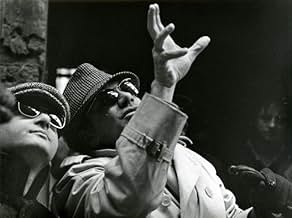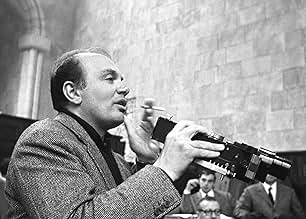NOTE IMDb
7,6/10
3,6 k
MA NOTE
Avant l'élection du conseil municipal, l'effondrement d'un immeuble conduit un promoteur immobilier et ses soutiens politiques à se défendre contre un scandale.Avant l'élection du conseil municipal, l'effondrement d'un immeuble conduit un promoteur immobilier et ses soutiens politiques à se défendre contre un scandale.Avant l'élection du conseil municipal, l'effondrement d'un immeuble conduit un promoteur immobilier et ses soutiens politiques à se défendre contre un scandale.
- Réalisation
- Scénario
- Casting principal
- Récompenses
- 3 victoires et 5 nominations au total
Dany París
- Dany - Amante di Maglione
- (as Dany Paris)
Alberto Amato
- Consigliere Comunale
- (non crédité)
Renzo Farinelli
- Giornalista
- (non crédité)
Pasquale Martino
- Capo dell'archivio
- (non crédité)
Mario Perelli
- Capo dell'Ufficio Technico
- (non crédité)
Francesco Rigamonti
- Consigiliere Comunale
- (non crédité)
Renato Terra
- Giornalista
- (non crédité)
Avis à la une
Good inquiry movie, talking about the "roaring" '60 when every builder wanted to get richer and richer, basing his success on poor people's needs. It's a constant in Rosi's movies this political touch, but it's not about complaining about one party or the other, but it's more subtly focused on a certain italian laissez-faire in political matters and in social affairs that in some way is still alive today.
Its way of leaving a great space to dialogues and to silent scenes around the city contributes to create a journalistic approach and the witty speeches give the movie an interesting touch.
Well assembled, quite involving, an interesting piece about how power tends to contribute to its power only.
Also an essential view on the 60s and italian postwar society.
Its way of leaving a great space to dialogues and to silent scenes around the city contributes to create a journalistic approach and the witty speeches give the movie an interesting touch.
Well assembled, quite involving, an interesting piece about how power tends to contribute to its power only.
Also an essential view on the 60s and italian postwar society.
This film seems an effort to engage the life and destiny of a city at the level of the political and social, using journalistic techniques but always with an awareness that these are also interpretations - something that most USian journalism tends to overlook. What will mostly bother people is that it lacks the usual human center - the man/woman/family to which the bad things happen which will cause us to care that they are happening. This is hardly an oversight; it is a choice, and one that deserves to be considered openly without the rush to judgment that otherwise occurs when confronted with the unfamiliar. The human center of the film is there, but always at the edges, implied. We barely glimpse the victims of the collapsed building, but their fate informs every frame. And the superb "portrayals" by actual members of the city council (the De Vita character, e.g.) give us not actors, but people enmeshed in the actuality. This film deserves wider awareness.
10rowmorg
I don't recollect giving many 10s. This film has to get the gong: it has it all, great acting, great scenario, brilliant direction, it's one of those films that feels like a slice of life rather than a drama. It could have been made yesterday, although not in the USA, I hasten to add, which is a shame because it really describes the post-WW2 dispensation imposed on Italy by the USA, with the aid of the Comorra, the criminal tribal system of greater Naples. The quintessential American figure, the property developer, played by US icon Rod Steiger, stands at the centre of this maelstrom of a movie, denounced daily on all fronts by the leader of the Left forces, De Vita (Carlo Fermariello), and catered to by the assortment of running dogs and capos on the Right. This movie performs nothing less than open-heart surgery on a great city at a turning point in its history: the eloquence, the in-fighting, the soul-searching. It also contains some great film-making, particularly the initial fatal building collapse that triggers the narrative. This film gets to the heart of what went wrong with the modern city, and it has attained the status of universality. In my opinion, every American high-school student should be obliged to view it in order to graduate from High school.
The first quarter of an hour of this film is completely mesmerising as we see a series of overhead shots of the different sides to the city of Naples and then the incredibly shot building collapse. At the same time we are made aware of the corruption in the building industry and how most of the money ends up in the same place all the time. Rod Steiger plays the main villain of the peace and it is an extraordinary performance. For considerable periods we simply see him prancing about his office, clearly struggling to think of the best way out of the immediate problem, the best way to get more political power and the best way for him and his son to stay on top. he expresses so much, and in such an Italian way, the pressures his constant messing with peoples' lives brings him. There are many fine sequences as the various political factions gang up and then get bought off as the big man inevitably gets his way. I preferred the slightly more fictionalised and later Three Brothers and Illustrious Corpses but this near documentary impression of Italy's boom building phase is very impressive and involving.
Rod Steiger as a local city politician in an Italian film by Francesco Rosi makes a virtuoso performance as usual in his younger days and is convincing enough in fluent Italian in one of Francesco Rosi's usual almost documentary panoramic exposures of social life especially in relation with power. Everything appears absolutely natural here, as if you were yourself present at all those turbulernt political meetings with votations and intrigues around the mayor, and the crisis is brought on by a collapsing building of many storeys and flats owned by local leaders of the city government, who choose to fight it out against allegations of corruption, and the council scenes with dramatic quarrels Italian style pounding on in heated passion are the best of the film. It happens in Naples, but the situation could be anywhere in any great city in the world planning to exploit and make money on new suburb constructions of horrible inhuman skyscrapers all looking the same - with new prospects of coming tumbling down.
Le saviez-vous
- AnecdotesRosi considered realizing a documentary, but fearing the Italian censorship, since many political protagonists he wanted to denounce were still in charge at the time, he chose a fictional story instead. He however added a note by the end of the movie: "The characters and facts narrated here are fictional, but the social and environmental reality that produces them is real".
- Crédits fousWestern Electric is misspelled ('Elettric').
- ConnexionsEdited into Colpiti al cuore (2019)
Meilleurs choix
Connectez-vous pour évaluer et suivre la liste de favoris afin de recevoir des recommandations personnalisées
- How long is Hands Over the City?Alimenté par Alexa
Détails
Box-office
- Montant brut mondial
- 328 $US
- Durée1 heure 41 minutes
- Couleur
- Rapport de forme
- 1.85 : 1
Contribuer à cette page
Suggérer une modification ou ajouter du contenu manquant











